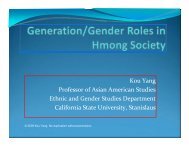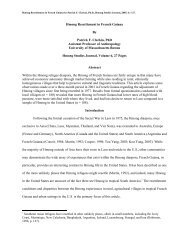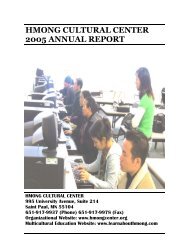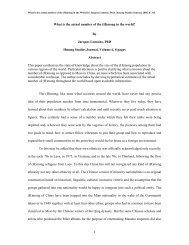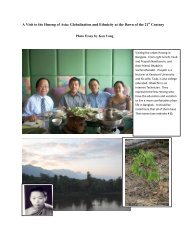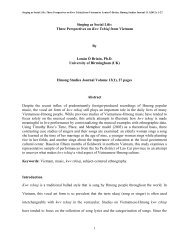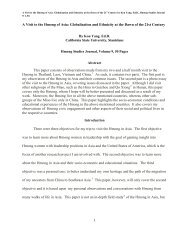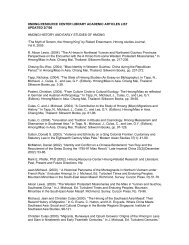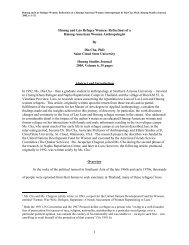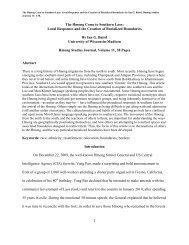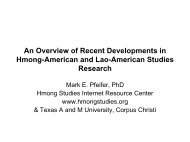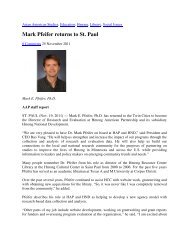Research Notes from the Field - Hmong Studies Internet Resource ...
Research Notes from the Field - Hmong Studies Internet Resource ...
Research Notes from the Field - Hmong Studies Internet Resource ...
Create successful ePaper yourself
Turn your PDF publications into a flip-book with our unique Google optimized e-Paper software.
<strong>Research</strong> <strong>Notes</strong> <strong>from</strong> <strong>the</strong> <strong>Field</strong>:Tracing <strong>the</strong> Path of <strong>the</strong> Ancestors – A Visit to <strong>the</strong> <strong>Hmong</strong> in China by Kou Yang, EdD,<br />
<strong>Hmong</strong> <strong>Studies</strong> Journal, 2005, 6: 1-38.<br />
most <strong>from</strong> <strong>the</strong> booming Chinese ethnic/cultural tourist industry are not <strong>the</strong> peasants and <strong>the</strong> minorities, but<br />
<strong>the</strong> people living in <strong>the</strong> cities and working in <strong>the</strong> government. Travel agencies, hotel industries, transportation<br />
providers, restaurants, and employees of <strong>the</strong>se industries stand to benefit <strong>the</strong> most. The government also<br />
benefits <strong>from</strong> taxes and fees generated <strong>from</strong> <strong>the</strong> tourist industries.<br />
Although migration <strong>from</strong> rural areas to <strong>the</strong> many large cities in Guizhou has recently been on <strong>the</strong> rise,<br />
<strong>the</strong> majority of <strong>the</strong> Miao people in <strong>the</strong> province continue to live in rural and mountainous areas. Many rural<br />
villages continue to be untouched by modernization and tourists, while some minority villages have been<br />
strongly impacted by ethnic tourism (Wu, 2000). Corrigan (2002: 14, 16) writes “The Valley floors are <strong>the</strong><br />
richest areas while <strong>the</strong> hillside soil is shallow and rocky, making farming difficult” and families living in <strong>the</strong><br />
mountains often cannot grow enough food to support <strong>the</strong>mselves. Consequently, those who live on <strong>the</strong> hills<br />
tend to be poorer than those who live on <strong>the</strong> valley floors. Guizhou has been known as one of <strong>the</strong> poorest<br />
provinces in China. Although <strong>the</strong> Miao are one of <strong>the</strong> poorest ethnic groups in Guizhou, a few have stood to<br />
benefit <strong>from</strong> <strong>the</strong> Chinese market economy, which has just recently reached <strong>the</strong> province’s many major cities.<br />
This author met with several of <strong>the</strong>se young entrepreneurs. One of <strong>the</strong>m is reputed to own many skyscrapers<br />
and o<strong>the</strong>r businesses in Guiyang, <strong>the</strong> Capital of Guizhou. His businesses include a construction and real<br />
estate company, an advertisement agency, and several o<strong>the</strong>r enterprises. Many of <strong>the</strong> new rich of Guiyang are<br />
involved with <strong>the</strong> very competitive real estate businesses.<br />
Reflections of <strong>the</strong> <strong>Hmong</strong> Participants of <strong>the</strong> Fulbright Group Project to China<br />
Senda Chang, a <strong>Hmong</strong> American student of teacher education born in <strong>the</strong> United States, was very<br />
surprised about what she learned related to <strong>Hmong</strong> history on <strong>the</strong> tour. She said her fa<strong>the</strong>r told her that <strong>the</strong><br />
<strong>Hmong</strong> came <strong>from</strong> Mongolia, but she learned <strong>from</strong> many Professors in China that <strong>the</strong> <strong>Hmong</strong> ancestral home<br />
is in Central China and that <strong>the</strong> <strong>Hmong</strong> have a very long history <strong>the</strong>re. She explained “it was very emotional<br />
for me because that’s [China] where my ancestors came <strong>from</strong>. My parents never had an opportunity to see<br />
China” (Turner, 2004). Reflecting on <strong>the</strong> trip, she wrote “I have learned more about <strong>the</strong> origin of <strong>the</strong><br />
<strong>Hmong</strong> people, <strong>the</strong>ir struggles and strengths, and <strong>the</strong>ir relationship with <strong>the</strong> mainstream culture. I have<br />
learned that minorities everywhere share common denominators. I can compare it with <strong>the</strong> relationships<br />
that exist here in <strong>the</strong> United States. Because of this trip, I plan to complete a Master's degree and/or<br />
Dissertation on minority-majority relations with an emphasis on <strong>the</strong> <strong>Hmong</strong> people.”<br />
O<strong>the</strong>r <strong>Hmong</strong> members of <strong>the</strong> group raised questions about <strong>the</strong> language differences between <strong>the</strong><br />
<strong>Hmong</strong> in Sou<strong>the</strong>ast Asia and <strong>the</strong> Miao in China. Many of <strong>the</strong>m questioned <strong>the</strong> notion that all of <strong>the</strong> groups<br />
24



